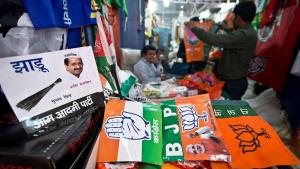After the demonetization of November 8, Aam Aadmi Party (AAP) pulled out of local civic elections of both Mumbai and Chandigarh. It can be a coincidence—or after-effects of a surgical strike.
Congress leaders are crying hoarse that demonetization decision is not financially motivated. Instead, it’s politically driven. That this decision has been taken in view of forthcoming UP assembly elections.
Amidst this chaos and din on the demonetization debate by the political parties, two critical issues regarding elections reform are acquiring significant prime time space. One, is that the state and Lok Sabha elections must be held simultaneously; two, elections should be state-sponsored.
If black money due to current demonetization drive is shrunk, the biggest loss will be to the political parties. Secondly, in a country where assembly and Lok Sabha elections, despite the limit on is spending, cost hundreds of times more to political parties, the move to have it state-sponsored would be nothing less than revolutionary.
Those candidates who in the name of donation take truckloads of money from builders, land mafia and industrialists, set themselves about returning “favours” once the contested seat becomes their own for five years. Constituents who elect their representatives with hope get a short shrift. Thus if the “money factor” is made negligible in election process, it could be hoped that decisions would be taken to suit the general welfare.
This could be a revolutionary move to get rid of dynastic ambitions and powerful forces who dictate the electoral politics of this country. This is a country where a candidate is constitutionally assured to fight an elections but the truth is without money, he or she is in no position to make a meal out of it. But if the elections are state-sponsored, there are chances that bright and professional citizens from any walk of life would be picked up by political parties to fight elections under their banner.
In a country where the expense limit for a Lok Sabha candidate is Rs 70 lakhs and for an assembly seat a maximum of Rs 28 lakhs, it is generally believed that a candidate actually ends up spending up to Rs 25 crores in a bid to make it to the Parliament.
According to Centre for Media Studies, the 2014 General Elections cost around Rs 35000 crores—though the figures of Election Commission is significantly different.
If the Lok Sabha and Assembly elections are state-sponsored, the expenses incurred would be remarkably less. The time has come that after demonetization, in order to sterilize black money in electoral battles, some surgical strikes are inflicted on the election process in the country.


